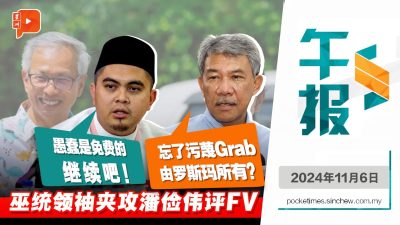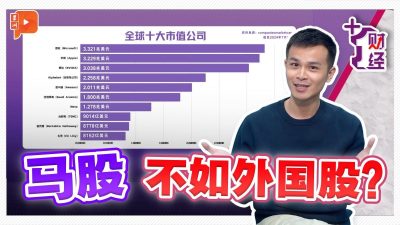
KUALA LUMPUR: To Datuk Amirul Feisal Wan Zahir, the job of leading Khazanah National Bhd, the national investment institution managing assets worth hundreds of billions of ringgit, is a unique role that requires striking a balance between national development and investment returns.
He recalled the challenges when he first took office four years ago, during a period of frequent political transitions in the country.
However, stability and clarity only emerged after the current government was formed and the Madani Economic Framework was introduced.
In an exclusive interview with Sin Chew Daily, Amirul Feisal said, “I have held leadership positions in various investment firms both domestically and abroad, and have also been an entrepreneur. However, Khazanah is entirely different.”
He explained that while typical businesses focus on specific products or customer segments, Khazanah’s stakeholders include not only the government but companies of all sizes and communities affected by its investment activities. Its influence is extensive.
“It’s like holding on to two missions; Khazanah must invest like a fund manager while considering the development in Malaysia.
“Looking at this role, I would say it is more complex, but also more fulfilling,” he said.
Malaysia was experiencing the Covid-19 pandemic and Movement Control Orders when Amirul Feisal assumed office in July 2021.
His first meeting with the team had to be conducted virtually via video conferencing.
“That was a challenging period. I still remember the political uncertainty during the transition between two prime ministers in 2021, coupled with geopolitical risks abroad.
“It wasn’t until after the 2022 general election, when the current government introduced the Madani Economic Framework, that the nation finally gained stability and clarity.
“This has been tremendously helpful as the government has now set a clear course for the country’s progress.
“I am pleased that things have improved significantly.”
When asked whether Khazanah’s decision-making was affected by leadership changes, Amirul Feisal asserted that every prime minister recognised the importance of Khazanah’s role in value creation and nation-building.
“In fact, our mission has never changed. The approach and priorities may vary slightly, largely depending on each managing director – including myself,” said Amirul Feisal.
He noted that the government’s focus may shift over time. Some administrations may prioritise development projects while others may emphasise investment returns.
“To align with national objectives, the vision and aspirations of each prime minister are crucial.
“Fortunately, despite differences in leadership direction, you’ll find that when it comes to value creation, capacity building or innovation, no prime minister has ever denied their importance.
“That’s why we have not undergone drastic transformations.”
Structured framework and scientific approach
Amirul Feisal believes that sound financial management principles play a key role in maintaining stability.
By adopting a structured framework and scientific approach, Khazanah can present proposals to the government, allowing for valuable projects to proceed, such as the allocation of funds for the restoration of iconic heritage buildings around Sultan Abdul Samad Building.
Before becoming Khazanah’s Managing Director, the 55-year-old former Malayan Banking Chief Financial Officer had served as the Executive Vice President of Special Projects at Permodalan Nasional Berhad (PNB).
He had also worked in investment banks and corporations in Hong Kong, Singapore and the United Kingdom, and holds a Bachelor’s degree in Economics from the London School of Economics and completed an Advanced Management Programme at Harvard Business School.
He admitted that Khazanah’s role is inherently complex, and his approach is to ensure that employees understand the organisation’s core mission of advancing Malaysia’s development.
“This helps the organisation withstand external pressures, allowing us to continue our operations, coordinate activities and execute our tasks effectively.”
Personally, Amirul Feisal believes in finding one’s life purpose and leveraging one’s current role as a platform to fulfil the purpose.
“When leading a team, I do not use a push-pull strategy. Instead, I encourage everyone to move forward toward a shared goal.
“In other words, align your personal mission with the company’s focus.
“If you are passionate about your work, you will be able to formulate better strategies. This is what I strive for, having a strong career ambition leads to greater achievements.”
Diversified investments to mitigate risks
Amirul Feisal pointed out that uncertainties surrounding U.S. President Donald Trump’s policies have caused market volatility, making private equity exits challenging.
As a result, Khazanah will adopt a diversification strategy to mitigate risks and focus on inflation-resistant assets while avoiding highly speculative investments.
He noted that 2025 will be challenging due to post-pandemic global complexities, macroeconomic instability, and intensifying geopolitical issues that disrupt supply chains.
“Right now, the biggest uncertainty is Trump’s influence on the market.
“When there is uncertainty – be it in policies or markets – it becomes difficult to achieve growth. This makes the future somewhat challenging.”
Khazanah’s private equity investments shrank by 6.6 per cent in 2024, and Amirul Feisal acknowledged that this sector will continue to face difficulties this year.
Global private equity exits are becoming difficult
“Private equity investments require long-term commitments, typically with exit timelines of five to seven years.
“Last year, many private equity players expected market stability if Trump was re-elected, allowing them to ramp up transactions.
“However, with on-going market fluctuations, private equity exits have become challenging. For example, when attempting to acquire and list a company, the capital markets may underperform,” explained said.
Nonetheless, Amirul Feisal believes that long-term investors not in a rush to exit still have opportunities. However, those seeking quick exits will face difficulties.
He said Khazanah initiated a risk mitigation strategy five to six years ago.
“One way to reduce risk is through diversification. Our investment portfolio is already highly diversified, with long-term holdings.”
He stressed that as a government investment institution, Khazanah must balance investment returns with national development goals.
The majority of Khazanah’s assets are invested domestically in strategic sectors aligned with Malaysia’s development trajectory.
“At the same time, we maintain global investments to offset potential risks in Malaysia. If one investment performs well while another underperforms, they complement each other.”
Adjusting investments according to market trends
Khazanah also regularly fine-tunes its investments based on prevailing trends, carefully assessing risk factors associated with each asset and ensuring a thorough understanding of correlations.
“Of course, risk-cutting mechanisms have always been in place. We also make tactical decisions in public markets, just like any other fund manager.”
Amirul Feisal stressed that in today’s environment, investors should focus on assets that can withstand inflation and economic uncertainties while adhering to risk diversification strategies.
While some may turn to cryptocurrencies, Khazanah avoids high-risk speculative investments.
Khazanah has set a long-term investment return target of inflation plus approximately 3 per cent.
Over the past six years, its annual investment return rate has averaged 6.2 per cent, meeting its goals.
“Most of our investments are in Malaysia, primarily to fulfil our developmental mandate. We plan to increase the proportion of local investments to over 60 per cent.”
Government-owned sovereign wealth fund
Khazanah is a sovereign wealth fund fully owned by the Malaysian government.
According to its 2024 financial report, its net assets stood at RM103.6 billion as of last year, with operating profits of RM5.1 billion.
It paid RM1 billion in dividends to the government, achieving a net asset value weighted return rate (NAV TWRR) of 24.6 per cent for 2024 and an average of 6.2 per cent over five years.
A significant 93 per cent of total assets are allocated to various investment portfolios. Among them, 57.5 per cent are in the Malaysian stock market, 17.4 per cent in global equities, 16.5 per cent in private equity, and the remaining 8.6 per cent in real estate.
Apart from the privatisation of Malaysia Airports and Malaysia Airlines, Khazanah Nasional holds major stakes in leading companies such as CIMB Group, Tenaga Nasional, Axiata Group, CelcomDigi, and Farm Fresh, among others.
A smaller portion, or 7 per cent of assets, is allocated as development funds, including RM6 billion under the Dana Impak fund to support local entrepreneurship and the venture capital ecosystem.
RM1 billion of this is allocated to Jelawang Capital to assist start-ups through the Emerging Fund Managers Programme.
Amirul Feisal stated that Khazanah has a dual mandate: balancing national development with investment returns. Its stakeholders are not only the government but also corporate shareholders and the general public.
A significant portion of investments is made to generate returns, which provide dividends to the government and fund other development projects.
At the same time, over half of Khazanah’s assets are invested in publicly-listed companies across various sectors, positioning it not just as an investor but also a value driver that ultimately supports economic growth.
Read also:
ADVERTISEMENT
ADVERTISEMENT








































